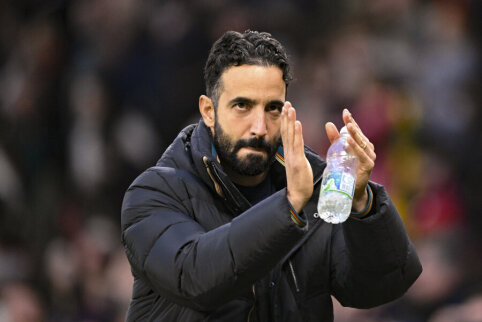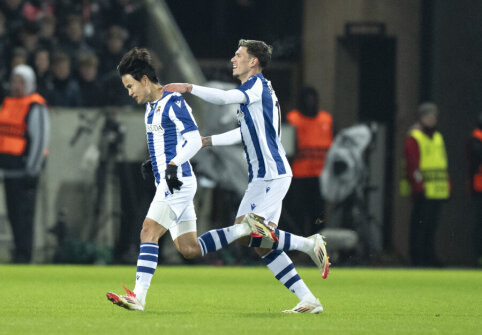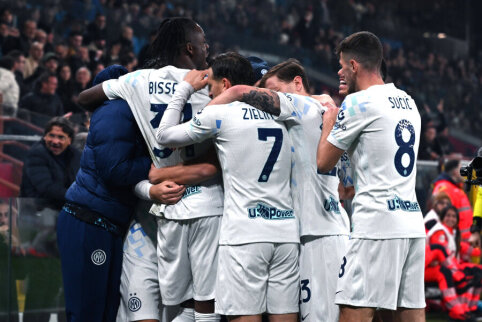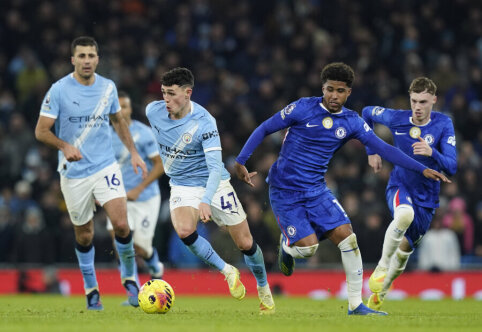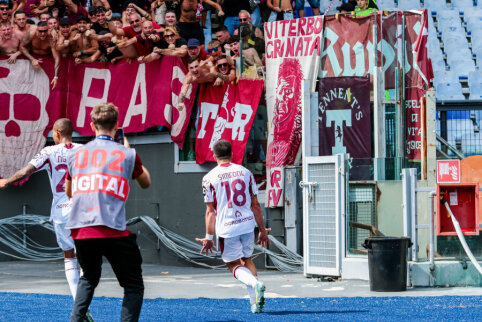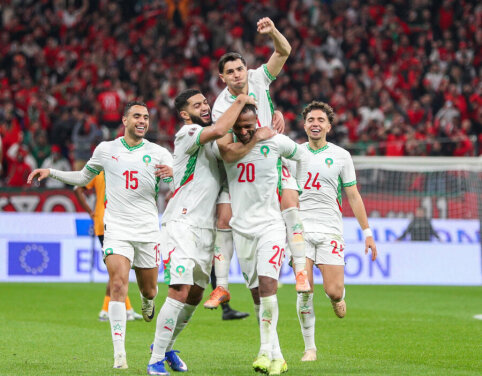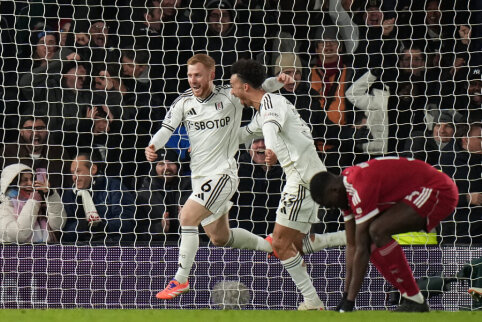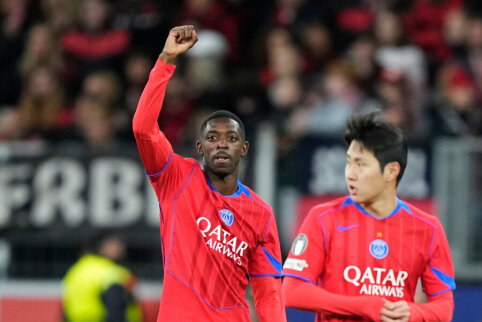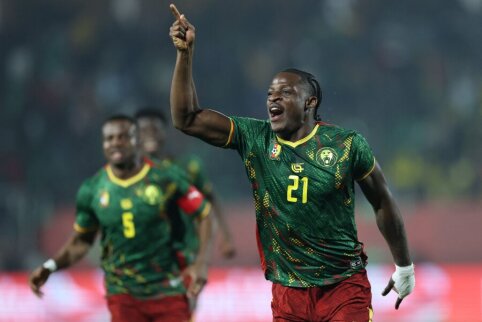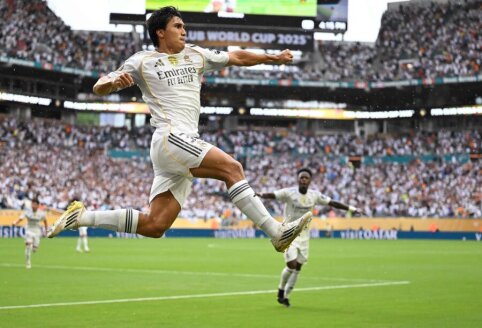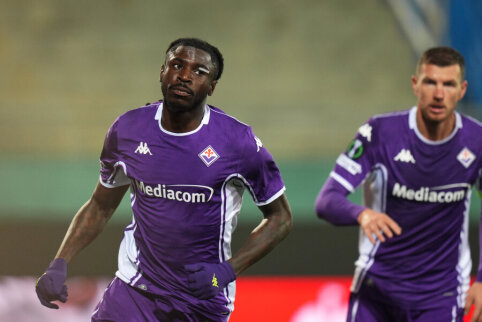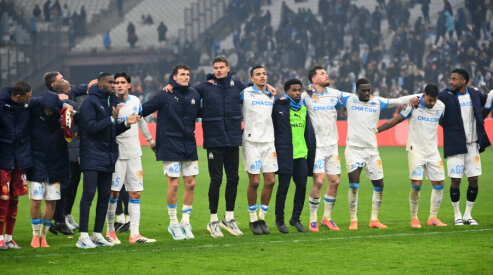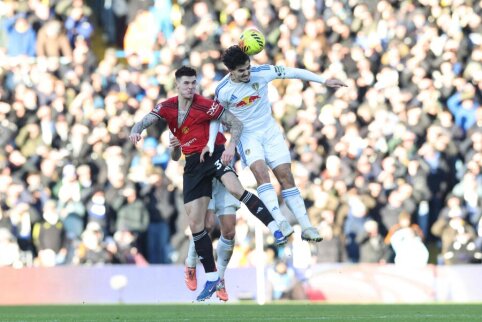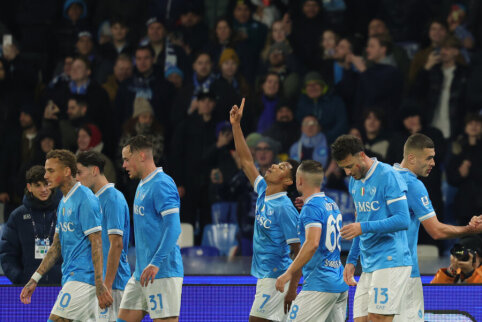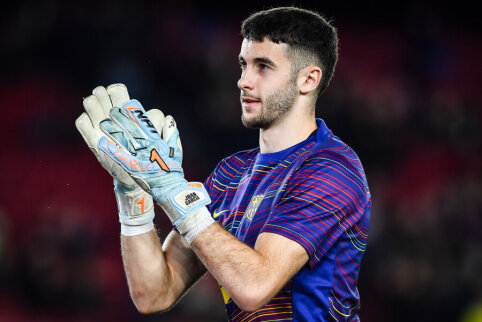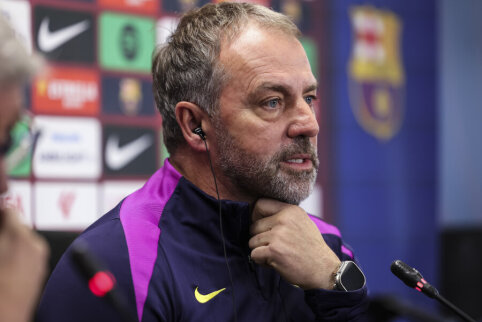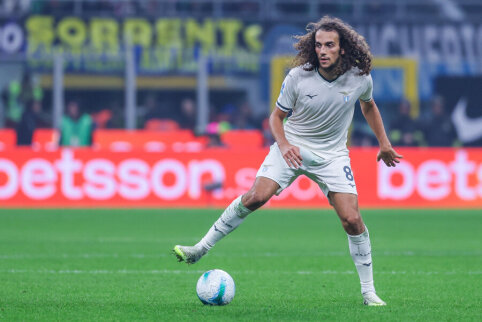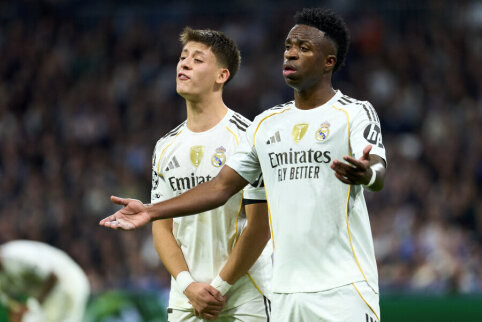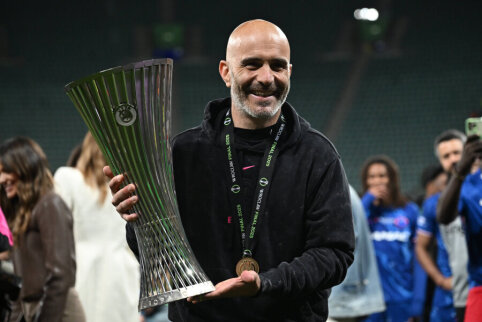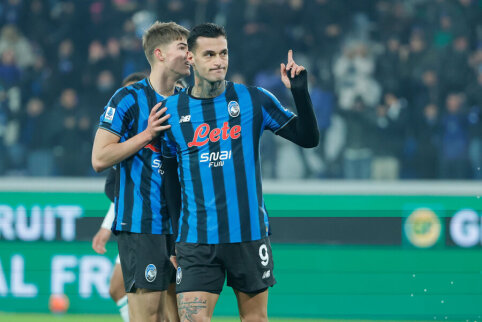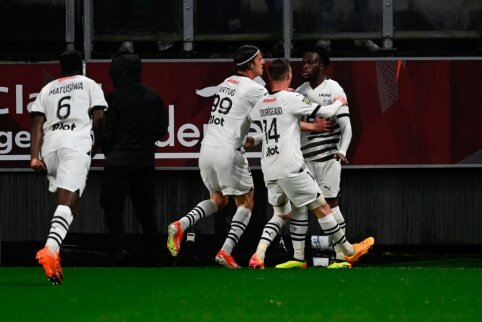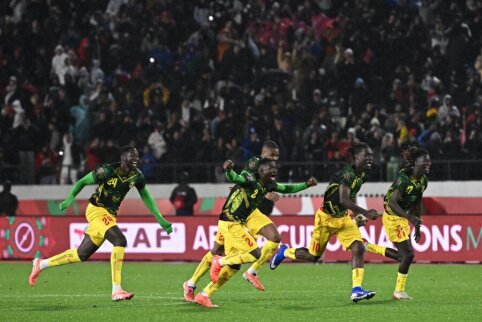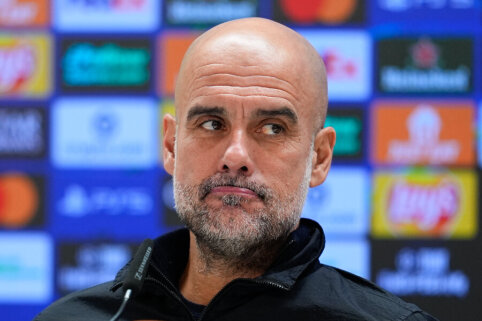 © EuroFootball.com
© EuroFootball.com
Almost half a year ago EuroFootball.com presented an interview to its visitors with one of the most interesting Lithuanian coaches, who was then the head coach of the "Šiauliai" team, Vytas Jančiauskas. Visitors themselves could ask questions to the respected coach, and he gladly answered them.
This time we decided to talk to the coach about all of Lithuanian football - the national team performance, the "A League", football infrastructure, the overall Baltic countries championship, the amateur "Sunday Football League". We present this interview to you.
How would you comment on the Lithuanian national team's performance in this cycle of qualifying for the 2006 FIFA World Cup?
I only went to one away game with the national team. I watched the other games at home. I like to watch matches on TV, because that's the best way to analyze the team's performance. When you're at the stadium, it's hard to concentrate, as you get caught up in the fans' influence and start rooting for the team yourself, leaving no time to watch the game as a football specialist.
Every match, the national team coaches select a specific tactic, analyzing the opponents' game, depending on whether they play at home or away. Speaking about the game itself, I would really like to thank our guys, who gave everything they could and more. Clearly, there was a lack of mastery. The team needs leaders to rely on throughout the cycle. If we had them, tactical plans would be drawn up accordingly. Currently, we have a situation where there are many similar players not complementing each other, but rather fighting for their position in the team.
There is no clear leader in defense, we have the Česnauskas brothers in goal, but one is still young and lacks experience, while the other is moved from team to team and cannot find himself as a player. In attack, supposed leaders should be Jankauskas and Danilevičius, but we get very few goals from them.
I believe the problem is that the national team is assembled, but the players know too little about each other. We need more joint camps where players can get to know each other, feel each other's game. This problem is perfectly visible when our national team attacks. The defenders don't know what the attackers will do, and the attackers are aimless and usually the passes to the defenders are misunderstood.
Players simply don't understand each other. As for a striker like R.Poškus, this player is constantly fighting and pressing the opposing defenders, but he expends too much energy and when the moment comes to score a goal, he lacks them.
It should be acknowledged that there is a certain generational change happening in the national team, so we shouldn't forget about the youth team. We could analyze the game of this team because both teams are closely related. This is our national team of the future.
Our national team has the goal of qualifying for the 2008 UEFA European Championship in the next qualifying cycle. We landed in the fifth pot, so we face really strong opponents. What do you think, are the goals set for the national team realistic?
The goals set are good. They should be. The team has started playing, and with each cycle, it should be raised. If we look at the team's performance in each match separately, we can say that we played really not worse, and even better than many teams. We all saw the last match against Belgium. We had many more opportunities. Where's the problem? We don't score. As I mentioned, the team lacks a leader who can score when needed.
We played a draw with Belgium away, then followed two matches against San Marino that we had to win, and we did, and a draw at home against the Spaniards. It was after those games that everyone started saying that we have a chance to qualify for the World Cup, but they didn't consider that there were still games with teams that were our biggest competitors - Serbia, Bosnia, and Belgium...
Indeed, only one goal was scored in the last four matches, and it wasn't us who scored it, it was a Belgian defender who did it for us. There is an unwritten rule in football - "If you don't score, they will." In the match against the Belgians, we saw a perfect example of this rule. We should also consider another thing. There are people who analyze the team's players, observing each of them. Perhaps there are some unknown things happening within the national team that prevent certain players from playing. Coaches, being close to the players, see these nuances perfectly and allow the better player, in their opinion, to step onto the field.
I think the national team's performance reflects the attention given by the state. In 15 years of independence, we don't have a single proper football stadium. I'm not talking about the efforts made by the Lithuanian Football Federation to create artificial football pitches for children in Panevėžys, Marijampolė, Alytus, etc., but these are not sports centers. These are just pitches on vacant lots. We need centers where the whole infrastructure is created, talented children are nurtured, of which Lithuania certainly has no shortage.
What can we say about children when even the clubs in the "A League" cannot manage themselves. Yes, "Vėtra" built a stadium, but what about others? The Vilnius "Žalgiris" stadium is in poor condition, the Kaunas "Žalgiris" stadium is a store. Until the government pays attention to football, it will be very difficult to do anything, as the LFF alone certainly cannot do everything. Even the youth teams, I'm talking about 15 to 17-year-olds, are lagging behind in their groups. Is that a miracle? No, not at all.
It is not a secret that a large part of the national team's players either sit on the bench or play in club reserve teams. Perhaps we should try to allow lesser-known Lithuanian footballers with playing experience onto the field?
I completely agree with you on that. Maybe in the last two games, which didn't decide anything, they should have given a chance to T.Radzinevičius, who I believe would have scored at least in one of those moments when T.Danilevičius shot the ball far away from the field. I watched Radzinevičius play in the "A League", and he certainly scores many goals from much more difficult situations than the opportunities Danilevičius gets.
What about I.Dedura, who often plays in the main squad of Moscow's "Spartak"? He is a high-level defender.
Without a doubt. Ignas Dedura almost always plays in the main squad, so he is in great sporting form. Besides, more and more foreign players are playing in the Russian league, which has greatly raised the level of this league. I think Dedura should definitely play, but I don't know what his connections are with the coaches in Lithuania. You see, if a person himself doesn't show the desire to go to the national team, you can't force him. Perhaps there are certain financial aspects, because once a player's career ends, they basically start their life anew, and as long as a person can earn money from football, they will do it. That's a mature player who thinks about "tomorrow". There are many nuances in this, but if they are financial, I will say it again, that the government doesn't allocate funds for football at all. I am not against basketball or other sports, but priorities need to be set. Football has always been and will always be the number one sport in the world. There's no hiding that. In Lithuania, basketball was artificially inflated. Now I teach a football specialty at VPU. Boys with heights of 185-190cm come to training. I see them kicking the ball and based on their movements, coordination, ball control technique, I can say that they wouldn't have become basketball players, but if some had seriously trained, they would be playing in the Lithuanian national football team now. The problem is that when a child has a choice of what to train, play basketball or kick a ball on a gravel field, certainly most parents, and the children themselves, choose what the conditions have been set for.
What can you say about the national team's players receiving yellow and red cards, of which there were certainly many in this cycle?
I think it's quite simple. Let's be honest. The major football countries see Lithuania as a football province, so players from other national teams can afford more than our players can. Then there is hostility from our players, but no matter what, it shouldn't exceed the behavior boundaries accepted worldwide. Let's look at E.Česnauskas. What was he thinking? After his gross mistake, after which a player should apologize, he took the card from the referee and threw it back. In my opinion, he got off easy. The punishment could have been much bigger. Of course, everything happens in major European clubs, but such cases are very rare. Speaking about D.Šemberas, watching his game in the national team, I keep asking myself - when will he be removed from the field at all? How many times has he already been sent off? Perhaps he should think about it a bit. After all, the referees also have a certain organization that meets and discusses certain players who are included in the so-called risk group. And while officiating, they pay more attention to those players. The same thing happened in the last matches against the Belgians. Perhaps there was no need to send D.Šemberas off, but since he is in that risk group, the player was expelled.
What do you think about the idea that emerged a few years ago to create a joint Baltic football league, similar to the one that basketball has?
Older football enthusiasts might remember that around 1993 or 1994, this league had already been attempted. It started but didn't end. Five teams from Lithuania, four from Latvia, around three from Estonia and the Kaliningrad region participated in it. It collapsed due to various political reasons - borders emerged, funding was poor, and traveling to away games was difficult. This idea is not lost. It should be implemented, just so that our businessmen in Lithuania see what Latvia and Estonia have. Bases, stadiums, training fields. It's not surprising at all that the Latvians made it to the final stage of the European Championship. I could not honestly say that Lithuania's national team is worse than Latvia's. That simply is not true. Just this league would help Lithuanian businessmen see why it is necessary to invest in football. I think until now football in Lithuania is not being built - it is being destroyed. 15 years ago, basketball was on par with football in Lithuania. And now? Basketball halls are full. Football - nowhere. Someone took and artificially destroyed football in Lithuania. Now it feels like we are all chanting basketball.
We were so close to having a great stadium in the Šeškinė district near the current "Akropolis". All plans were prepared excellently, and construction could have started. There were supposed to be five training fields with a large covered national stadium with 35,000 seats. It was supposed to be a real sports center. And what do we have now? Well, probably nothing, and I doubt there will ever be anything despite the promises we hear. The matter is that during G.Vagnorius's government, a large part of the stadium territory was sold off, and the money instead of being invested in at least one of the fields, was distributed by the government to the farmers who were protesting at that time.
Football, in Western Europe, is not only seen as a sport but as a great communication tool. Even some political issues are resolved through football. In the strongest European leagues, we can see many famous businessmen, politicians, public figures watching football and discussing various problems. The government needs to understand this.
As an example, take the "golden" days of Vilnius "Žalgiris". When I came there in January 1974, there was nothing either. Everything was in ruins. There were no bases, no players, no money. Then a new coach, A.Klimkevičius, came to the team, who gradually started molding the team from the youth. Bases appeared, special schools, the "Žalgiris" youth won all tournaments consecutively. That's when everything started. Funding was allocated, the "Žalgiris" sports base was opened, and players began to be paid.
A very specific question. What do you think, is Panevėžys "Ekranas" already the champion?
Yes. Oddly enough, "Ekranas" progressed throughout the entire season without stumbling. It is rare for a team to achieve that.
Could the residents of Panevėžys perform better in the Champions League qualifiers than FBK "Kaunas"?
In my opinion, as a coach, "Kaunas" is a better team than "Ekranas". The problem with FBK "Kaunas" is that, in my opinion, they are plagued by quite serious internal problems, whereas almost all "Ekranas" players have been playing together since childhood and are strong not individually, like the people from Kaunas, but as a team. That is their main strength. Many "Ekranas" players have played together in various age national youth teams, so they feel each other very well.
What do you think about the initiative to create the "Sunday Football League"? Is it necessary?
You know, such an initiative should be applauded. And we should wish for more people in other Lithuanian cities to want to play football in such leagues. A good example should be contagious. These leagues should only be expanded, perhaps shown on television, and it should be said that leisure time can be spent not only with a fishing rod but also kicking a ball in the fresh air, thereby relaxing. When I saw the match between the "Tygelis" and "Užupio" teams yesterday, my first thought was that this was the LFF I League match. The teams play with neat uniforms, there is a referee, excellent organization. It should be wished for the emergence of as many such teams as possible. This idea is definitely commendable.
